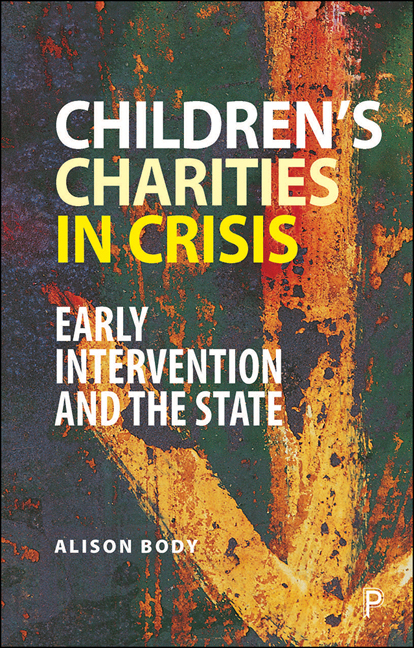Book contents
- Frontmatter
- Dedication
- Epigraph
- Contents
- List of Figures and Tables
- About the Author
- Acknowledgements
- Introduction
- Part I Preventative Services and Children’s Charities: Policy and Paradigm Shifts
- Part II On the Frontline of Early Intervention
- Part III The Lived Realities of Commissioning Children’s Early Intervention Services
- Part IV Concluding Thoughts
- Appendix: Data and Methods: Voices from the Frontline
- References
- Index
6 - The Changing role of Children’s Charities Delivering Early Intervention Services
Published online by Cambridge University Press: 04 March 2021
- Frontmatter
- Dedication
- Epigraph
- Contents
- List of Figures and Tables
- About the Author
- Acknowledgements
- Introduction
- Part I Preventative Services and Children’s Charities: Policy and Paradigm Shifts
- Part II On the Frontline of Early Intervention
- Part III The Lived Realities of Commissioning Children’s Early Intervention Services
- Part IV Concluding Thoughts
- Appendix: Data and Methods: Voices from the Frontline
- References
- Index
Summary
Early intervention is no longer about helping the postnatally weepy mother – we don't have time for that, because there is another one over there who is threatening to put a pillow over her baby's head – and that is what we now call ‘early’ intervention … we have become firefighters, nothing more. (Charity Worker, medium children's charity)
Introduction
We have thus far discussed how commissioning may be perceived as a failed project, and some of the challenges for both children's charities and commissioners in navigating the everchanging landscape. Let's now move on to explore the impact of commissioning and policy changes on early intervention and preventative services for children, delivered by the charitable sector.
As we have discussed, the definition of early intervention and preventative services is highly contested and politicised within policy and commissioning processes. This reflects an ongoing debate regarding the shifting paradigm of prevention. Indeed, providers debate and disagree about exactly what early intervention and preventative services should look like, and indeed who should deliver them. However, the one thing they disagree less about is a shared understanding that commissioning arrangements negatively affect the delivery of early intervention services for children and young people.
As the commissioning narrative has matured, there has been an overall disengagement between the providers and the state. As the state seeks to redefine preventative services, it has been simultaneously disengaging with children's charities as partners (see Chapter 5). In reality, this has meant a cessation of partnership meetings and lack of engagement from local authorities and associated commissioning organisations in terms of service design and needs analysis.
As the charitable sector is increasingly exposed to intensifying marketisation, polarisation of relationships increases. Indeed, the tendency towards this polarisation of relationships is significant in terms of the discussion concerning redefinition of preventative services, highlighting the apparent lack of voice and agency of children's charities in terms of defining this area of activity. Conversely, however, children's charities are increasingly picking up this work and delivering on this agenda.
Policy overview: the relationship between the charitable sector and the state
Practitioners, academics and policymakers have had a longterm interest regarding the ongoing interplay between the government and the voluntary sector.
- Type
- Chapter
- Information
- Children's Charities in CrisisEarly Intervention and the State, pp. 145 - 176Publisher: Bristol University PressPrint publication year: 2020



